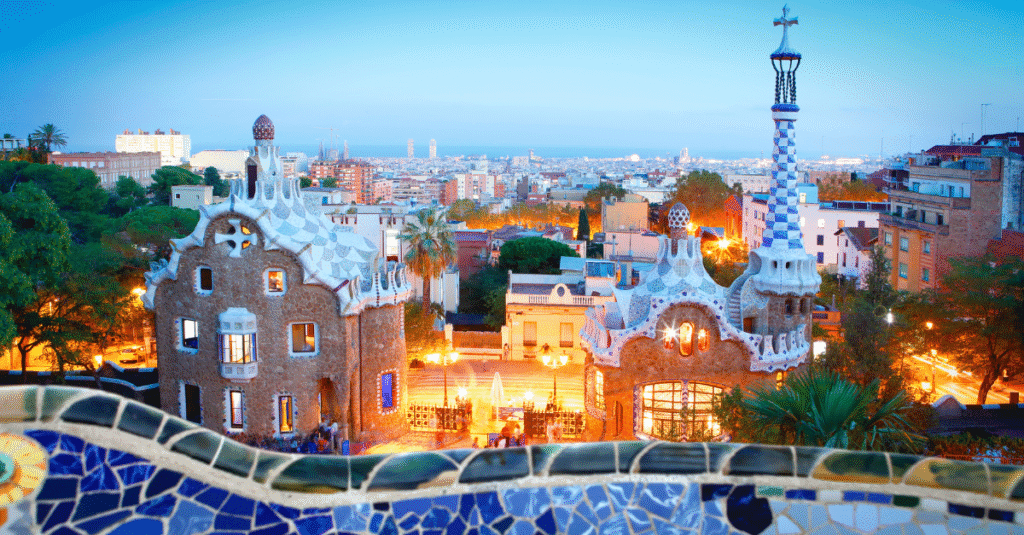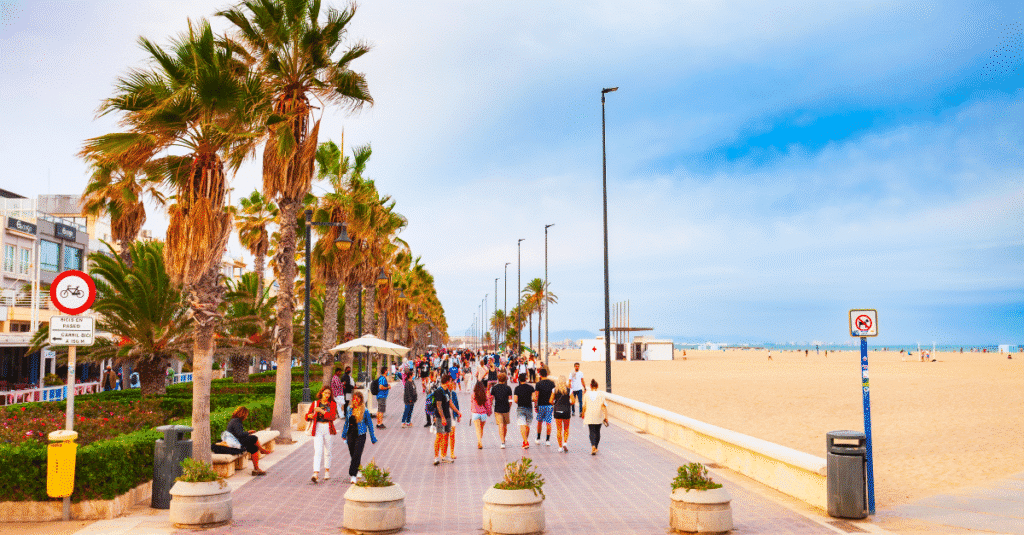Spain vs Portugal Digital Nomad Visa: which one is right for you? Both countries have become top choices for remote workers in recent years, offering a mix of sunny weather, affordable living, and vibrant nomad communities. With dedicated visa options now available in both Spain and Portugal, freelancers, startup founders, and remote employees are wondering which destination offers the better long-term setup.
This guide breaks down the Spain and Portugal Digital Nomad Visas side by side, from eligibility and taxes to lifestyle perks and residency pathways, so you can make an informed decision for your 2025 move.
(Article Updated May 2025)
Table of Contents
- Digital Nomad Visa Comparison: Spain vs Portugal
- Spain vs Portugal Digital Nomad Visa Requirements
- Spain vs Portugal Digital Nomad Visa Tax Implications
- Cost of Living Comparison: Spain vs Portugal
- Lifestyle & Digital Nomad Communities
- Portugal vs Spain Digital Nomad Visa Process: How Long Does It Take
- Long-Term Residency and Citizenship
- Final Verdict: Spain vs Portugal Digital Nomad Visa?
- Frequently Asked Questions About Spain vs Portugal Digital Nomad Visa
- Ready to Choose Your Perfect Digital Nomad Destination?
Digital Nomad Visa Comparison: Spain vs Portugal
Both Spain and Portugal have introduced digital nomad visas to attract remote workers from outside the EU. While the visas are similar in purpose, each has unique features that can significantly affect your experience, from income thresholds and tax obligations to long-term residency options.
Below is a quick Spain vs Portugal Digital Nomad Visa comparison as of 2025:
| Spain Digital Nomad Visa | Portugal Digital Nomad Visa | |
| Launch Year | 2023 | 2022 |
| Initial Duration | Up to 3 years (renewable) | Up to 2 years (renewable) |
| Minimum Monthly Income | 2x Spain’s minimum wage (€2,763/month in 2025) | 4x Portugal’s minimum wage (€3,480/month in 2025) |
| Can it Include Family? | Yes, with an extra income requirement | Yes, with an extra income requirement |
| Remote Work Requirement | Must be employed or freelance for non-Spanish companies | Must be employed or freelance for non-Portuguese companies |
| Tax Residency Trigger | Over 183 days/year | Over 183 days/year |
| Special Tax Regime | Beckham Law (if eligible) | IFICI (formerly NHR, limited benefits from 2024 onward) |
| Path Citizenship | Yes, 10 years (less for certain groups) | Yes, after 5 years |
This overview gives a snapshot of how the two programs compare structurally, but as we’ll explore in the following sections, the real differences appear in taxation, lifestyle, and legal complexities.
Spain vs Portugal Digital Nomad Visa Requirements
When choosing between Spain and Portugal for your digital nomad base, understanding the eligibility criteria is crucial. While both countries welcome remote workers, documentation and requirements differ in ways that could impact your application strategy.
| Requirement | Spain Digital Nomad Visa | Portugal Digital Nomad Visa |
| Minimum Income (2025) | €2,763/month for main applicant + €1,036 for first family member + €345 each additional member | €3,480/month for main applicant + €435 per adult dependant (partner or child) + €261 per minor dependent |
| Work Eligibility | Remote work for non-Spanish companies. Max 20% income from Spanish clients. | Remote work for non-Portuguese companies. No Portuguese income allowed. |
| Required Documents | – Proof of income for the last 3 months. – Titles related to the activity or previous experience. – Employment or freelance contract. The contract must be 3+ months old, and the employer company must have been active for at least 12 months. – Proof of good standing of the employment company. – Criminal background check. – Spanish private health insurance. | – Proof of income for the last 3 months – Employment or freelance contract – Criminal background check – Valid travel insurance (public or private) – Proof of accommodation in Portugal |
| Application Options | You can apply from Spain or from your home country. | You must apply from your country of legal residence via the Portuguese consulate. |
| Processing Time | Approximately 20 working days from submission (Spain-based applications. | 60–90 days (varies by consulate). |
Key Differences Between the Spain and Portugal Digital Nomad Visas
- Portugal’s income threshold is higher than Spain’s, which may limit eligibility for some remote workers.
- Spain offers more flexibility for freelancers by allowing limited Spanish-sourced income.
- Application processing is faster in Spain if submitted while already in the country.
- Portugal requires a confirmed lease or accommodation at the time of application, which may be difficult before arrival.
For both visas, missing documents or failing to meet income thresholds can cause delays or rejections.
Want to know if you qualify? Our Spain Digital Nomad Visa and Portugal Digital Nomad Visa service pages have the full eligibility checklist plus expert tips.
Spain vs Portugal Digital Nomad Visa Tax Implications

When deciding between Spain and Portugal for your digital nomad base, tax obligations and everyday living costs can have a major impact on your lifestyle and savings. Here’s how they compare in terms of tax policy and affordability, giving you a clear digital nomad visa comparison from a financial standpoint.
Tax Regimes for Digital Nomads
Spain – Beckham Law (Special Expat Tax Regime)
- Eligible digital nomads can opt into the Beckham Law, which allows them to pay a flat 24% tax on Spanish-sourced income up to €600,000/year for 5–6 years.
- Foreign income (like dividends or rental income) is not taxed in Spain under this regime.
- Ineligible income (e.g., over €600,000 or Spanish rental profits) may be taxed at standard progressive rates (up to 47%).
- Must apply within 6 months of registering as a Spanish resident.
Portugal – NHR/IFICI (New Regime since 2024)
- Portugal’s Non-Habitual Residency (NHR) regime ended in 2024 and has since been replaced by IFICI, which no longer offers major tax exemptions for passive income.
- Digital nomads now pay standard Portuguese tax rates (14.5%–48%) on worldwide income, including foreign pensions and dividends.
- Some professional income (from “high value-added activities”) may still benefit from lower flat tax rates under transitional rules.
Tax Summary
| Country | Special Regime | Key Benefits | Duration |
| Spain | Beckham Law | 24% flat tax on Spanish income, no tax on foreign income | 5–6 years |
| Portugal | IFICI (NHR 2.0) | No longer tax-exempt; regular tax rules apply | 10 years |
Cost of Living Comparison: Spain vs Portugal
Here’s a general breakdown of typical monthly costs for a single digital nomad:
| Expense Type | 🇪🇸 Spain (Barcelona/Madrid) | 🇵🇹 Portugal (Lisbon/Porto) |
| Rent (1 Bedroom city center) | €900 – €1,600 | €1,000 – €1,400 |
| Coworking space | €150 – €250 | €120 – €200 |
| Groceries | €250 – €350 | €200 – €300 |
| Public transport | €20 – €60 | €30 – €50 |
| Lifestyle (gyms, cafes, etc.) | €300 – €500 | €250 – €400 |
Overall, Portugal tends to be slightly more affordable, especially in secondary cities like Porto or Coimbra. However, Spain offers a broader infrastructure for remote workers, particularly in larger urban hubs.
Many digital nomads make the mistake of choosing a destination based on lifestyle alone, only to discover later they’re overpaying taxes or missing out on legal advantages.
Our international legal team helps you evaluate your unique income structure, optimize for local tax benefits, and make an informed choice based on your priorities.
Lifestyle & Digital Nomad Communities
Both Spain and Portugal offer vibrant lifestyles and active digital nomad scenes. The vibe, pace, and infrastructure can differ quite a bit between the countries, depending on the city you choose. Here’s how they stack up across popular hubs.
Lisbon

Portugal’s capital is a top-tier digital nomad destination. With scenic viewpoints, reliable public transport, and high-speed internet, it blends tradition with tech startup energy. The city offers dozens of co-working spaces, and many cafes double as workspaces.
Porto

Quieter and more affordable than Lisbon, Porto is ideal for creatives and remote workers who prefer a slower pace. The expat scene is smaller but growing, and the city boasts strong cultural charm.
Portugal is extremely foreigner-friendly. English is widely spoken, especially in Lisbon and the Algarve. There’s a strong presence of nomads from the US, UK, and Germany. It’s perfect for those who enjoy a slower-paced, relaxed lifestyle. Some of Portugal’s highlights include surf, wine, and walkable streets.
Barcelona

One of Europe’s digital nomad capitals, Barcelona offers beachside living, top-tier coworking spaces, fast internet, and a buzzing international scene. Great for networking and meeting other professionals.
Madrid

The Spanish capital is slightly more formal than Barcelona but still offers a strong digital infrastructure and plenty of cultural perks. Excellent transport, endless tapas bars, and modern apartments attract professionals and remote workers alike.
Valencia/Málaga

Smaller cities like Valencia and Málaga are becoming remote work havens thanks to lower costs and a warmer climate.
The expat community in Spain is large, diverse, and active. English is less widely spoken outside of major cities, but it is improving. Spain is perfect for expats who want to enjoy lively, social, late nights while experiencing deep cultural traditions.
Co-Working & Connectivity Snapshot
| City | Coworking Cost (avg/month) | Avg Internet Speed | Community Vibe |
| Lisbon | €150–€250 | 150–200 Mbps | Chill, collaborative |
| Porto | €120–€200 | 100–150 Mbps | Creative, small-scale |
| Barcelona | €200–€300 | 200+ Mbps | Dynamic, international |
| Madrid | €200–€280 | 200+ Mbps | Professional, busy |
Which is better for you?
- Choose Portugal for a calmer lifestyle and affordability.
- Choose Spain for a fast-paced experience with stronger infrastructure and professional networking.
Portugal vs Spain Digital Nomad Visa Process: How Long Does It Take
When deciding between the Spain and Portugal digital nomad visas, the application process and timeline can be a major deciding factor, especially if you’re aiming to relocate quickly.
| Category | Portugal | Spain |
| Where to Apply | Apply at Portuguese consulate in your home country. Once approved, you’re granted a 4-month entry visa. Next, enter Portugal and attend AIMA (immigration office) appointment to get your residence permit. | Option 1: Apply from Spanish consulate Option 2: Apply from within Spain (on tourist visa) |
| Processing Time | Consulate Stage: about 2–3 months Residence Permit Stage: about 2–6 months to get an appointment, depending on demand and AIMA backlog. | In-Country Application: Typically processed within 20 working days (about 1 month). Consulate Route: Can take 1–3 months, depending on consulate efficiency. |
| Total Time to Full Approval | Around 4–9 months, depending on how early you book the AIMA appointment. | As fast as 1 month if applying from within Spain. |
| Advantages | You can arrive and begin life in Portugal while waiting for your residence permit. | – Can apply from home country or in Spain. – Faster path if you’re already in Spain. |
| Disadvantages | – Must apply from your home country. – Long AIMA delays can lead to uncertainty if not managed early. | In-country applications require all paperwork to be ready on day one, a challenge without legal support. |
Long-Term Residency and Citizenship
For digital nomads considering a longer stay, or even full relocation, understanding the paths to residency and citizenship is essential. Spain and Portugal both offer routes to permanent residency and citizenship, but the timelines and requirements differ.
| Category | Portugal | Spain |
| Visa Duration | 2-year permit, renewable for 3 more years | 3 years if applying in-country; 1 year if from abroad (renewable) |
| Permanent Residency Eligibility | After 5 years of legal residence | After 5 years of legal residence |
| Citizenship Eligibility | After 5 years of legal residence | After 10 years (general rule); 2 years for select countries, 1 year for descendants of Spaniards |
| Key Conditions for Citizenship | – Must have maintained legal residence without long absences. – Demonstrate integration (A2-level Portuguese language test required). – Clean criminal record and proof of income/ties to Portugal. | – Must have maintained continuous legal residence without long absences. – Clean criminal record and proven integration. – Spanish language test and cultural knowledge exam (DELE A2 and CCSE). |
Final Verdict: Spain vs Portugal Digital Nomad Visa?
So, the question remains: Spain or Portugal? Both offer excellent digital nomad visa options, but the best choice depends on your goals, lifestyle preferences, and financial setup.
Choose Portugal if:
- You want faster access to permanent residency and EU citizenship (5 years).
- Your income comes from passive sources (like investments or pensions), which Portugal historically favored, though new tax rules should be reviewed.
- You prefer a lower cost of living in cities like Lisbon or Porto.
- You value a relaxed pace of life and a strong, close-knit expat community.
- You’re coming from a non-EU country and want a clear path to settle long-term.
Choose Spain if:
- You’re a remote employee or freelancer looking to benefit from the Beckham Law, which offers reduced tax rates for up to 6 years.
- You’re drawn to larger, vibrant cities like Barcelona or Madrid with more international business presence and faster travel connections.
- You prioritize lifestyle, food, and cultural access, even if the citizenship timeline is longer.
- You’re originally from Latin America, the Philippines, or Andorra and qualify for Spain’s reduced 2-year citizenship rule.
If your top priority is long-term settlement in Europe, Portugal likely wins. But if you’re seeking a dynamic lifestyle and temporary tax benefits, Spain may be your better fit.
Before making a move, get clarity on how each country’s visa requirements and tax system apply to your unique situation. Fill out the form below to get your free digital nomad visa consultation.
Frequently Asked Questions About Spain vs Portugal Digital Nomad Visa

Which is better for digital nomads, Spain or Portugal?
It depends on your goals. Portugal’s digital nomad visa is great for long-term settlement, with quicker access to permanent residency and citizenship. Spain’s digital nomad visa offers lower taxes for remote workers under the Beckham Law and better access to large cities and coworking networks.
What are the income requirements for each visa?
For Portugal, you’ll need to show a monthly income of at least €3,480 (4x Portugal’s minimum wage in 2025).
For Spain, the minimum is around €2,763/month (200% of Spain’s monthly minimum wage). Proof of remote work, bank statements, and contracts are required for both.
What’s the tax difference between Spain and Portugal?
Spain offers the Beckham Law: flat 24% income tax on earnings up to €600,000/year for six years.
Portugal’s digital nomad visa no longer includes the old NHR tax perks, meaning most global income is now taxed under regular Portuguese rates (14.5%–48%). However, tax treaty protections may apply to prevent double taxation.
Ready to Choose Your Perfect Digital Nomad Destination?
Spain and Portugal both offer attractive digital nomad visa paths. The right choice depends on your lifestyle, income structure, and long-term goals. Spain may be ideal for those who want lower taxes and access to vibrant cities like Barcelona or Madrid. Portugal suits remote workers looking for a slower pace, an easier path to citizenship, and a strong international community in cities like Lisbon or Porto.
No matter where you land, moving abroad comes with legal and tax complexities, especially when income, residency, and timelines are involved.
Lexidy’s immigration and tax teams help remote workers and freelancers relocate smoothly to Spain or Portugal. From visa applications to tax structuring and long-term residency planning, we’ll guide you every step of the way.
Whether you’re ready to move forward or just exploring your options, you’ll find everything you need on our Spain Digital Nomad Visa or Portugal Digital Nomad Visa service page — or simply fill out the form below to speak with our team.

